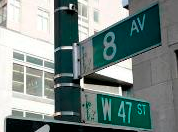Wall Street has been front page news ever since Lehman Brothers went under back in 2008, and the adverse times that followed for the financial sector have been especially troubling in the Manhattan luxury real estate world, where the sales and rental markets have traditionally been upheld by young financiers with money to spend. But it turns out that the relationship between Wall Street and the Manhattan rental apartment market is not as strong as once believed, because Wall Street's struggles have yet to affect the luxury rental market.
According to data compiled by Nancy Packes Inc., 58% of renters below 96th Street in Manhattan made their money in finance in 2005. This year that number is down to 41%, yet the market hasn’t missed a beat. What changed? The economic landscape of New York City is now broadening and diversifying as tech- and creative-companies fill the void left by the decline of Wall Street. People in the tech and creative sectors now account for 12.8% and 13.5% of leases south of 96th Street, respectively, up from 7.2% and 8.57% in 2005. The tech-industry especially has picked up the slack for the Street, so times really have changed - brokers are almost as likely to run into a computer programmer looking to lease an apartment in Manhattan as they are a banker.
This market diversification will not only help to ensure that the Manhattan real estate market continues to thrive, it will keep the Manhattan economy moving during a time when its main engine is faltering. The New York State Comptroller predicted that the city could lose nearly 10,000 securities jobs by the end of 2012. Plus, those in the financial industry that do keep their jobs may be making less.
Twenty or thirty years ago, this might have spelled trouble for the Manhattan real estate market, but the emergence of the high-tech and creative fields has turned it into a relatively minor story. We have other industries - education, law, health services, and business service included - that are picking up the slack and then some. As it stands right now, the Manhattan rental market is as strong as ever, and there is so much pent-up demand for luxury rental apartments that the woes of the Street have yet to have a real impact on the rental market, which is a tribute to the health and diversity of the New York City economy. Clearly, Wall Street is no longer the only game in town, something that everyone who works or rents an apartment in Manhattan should be grateful for.





